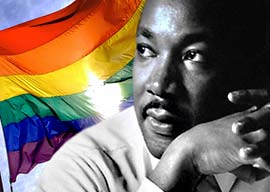
January 21, 2013

Martin Luther King Jr.
That’s right, gentle readers”Martin Luther King is currently a murder suspect.
Though it would be semi-retarded to allege a direct connection between MLK and any of the above incidents, the advent of another national holiday where I don”t get my fucking mail affords me the opportunity to speculate whether the avowedly nonviolent Baptist preacher and civil-rights martyr can ever be neatly and fully extricated from the topic of political and/or social violence.
Despite his violent death and the nationwide violence that erupted in its wake, and despite even what Ralph David Abernathy is alleged to have said, Martin Luther King”I mean the famous one, the 1968 murder victim, not the 2013 murder suspect”may have been an entirely peaceful man. Frankly, I didn”t know the guy. But I do know that in a speech he gave only weeks before he was slain in Memphis, he proclaimed that “a riot is the language of the unheard.” So despite his lifelong emphasis on nonviolent tactics, it seems as if even the saintly Dr. King may have been reconciling himself to the inevitability of violence in achieving political change.
A week before his murder, violence erupted at the tail end of a march that King was leading to protest the treatment of black Memphis sanitation workers. Black teens started smashing storefronts in downtown Memphis; in the ensuing melee, at least 64 people were injured and police shot a 16-year-old black youth to death. Although King officially distanced himself from the violence, he allegedly continued to negotiate with members of The Invaders, a black-power group thought by many to be responsible for the march’s violence.
As every American above the age of two knows, MLK was murdered with a gun. With the interminable recent voodoo jibber-jabber about gun rights, gun violence, saving the children, saving the children from guns, helping us save the children from guns by voluntarily turning in all our guns, snitching on other gun owners who aren”t willing to help the children by surrendering their guns, and the inevitable and final “empowerment” of the “people” as their last gun is taken away from their hands and placed in the warm bosom of the federal government, the blowtorch of media outrage seems selectively focused at the NRA types, who are presumably rural crackers, which means it’s OK to hate and mock them without feeling guilty.
Amid the gun-grabbing cacophony, you rarely hear that when it comes to violent crime, American blacks are “three times more likely than non-blacks to use a gun.” Nor are you often reminded of blacks” darkly comical statistical over-representation in American homicide stats. The complex pathologies of American gun ownership, like those broadly attributed to “the South” in general, are once again misdiagnosed as strictly a white thing. But we should never, as a nation, fail to acknowledge the rich and vibrant contributions that American blacks have made when it comes to gun crime.
The weightier question is whether political or social change can ever occur without violence, or at least the implied threat of force. It’s hard for me to tell which phenomenon had a deeper impact on American culture: King’s mostly nonviolent marches, or his murder and the ensuing nationwide urban conflagrations. Is it possible that white Americans finally started to comply with black demands not due to some big-hearted moral compulsion but because they were scared into “accepting” change?
If so, and if political power only truly comes from the end of a gun, I”d say it’s a good idea for all Americans, black and white, registered or contraband, to hold onto your firearms. Looks like you might need them sometime soon. And if you want to be safe, I”d suggest staying away from any place with “Martin Luther King” in its name. But you already knew that.